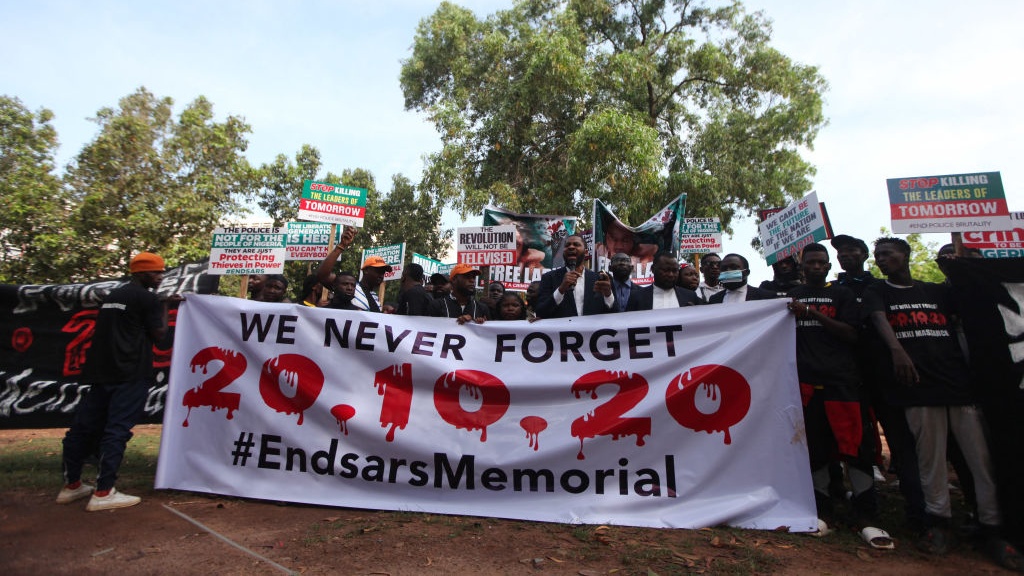One year ago, Nigerians took to the streets to call for the disbandment of the country’s Special Anti-Robbery Squad, or SARS.
The supposedly elite unit within the national Nigerian police force had become a veritable armed gang, targeting young Nigerians and their families with violence, kidnapping, extortion and other forms of abuses. Protests grew across Nigeria and internationally among Nigerians abroad and those showing solidarity in the streets and on social media.
Even after the SARS unit was formally disbanded, EndSARS grew into a larger campaign against police brutality and corruption in Nigeria more generally. Politicians and government officials vacillated between responding to protesters' demands, repressing demonstrations and downplaying the significance of widespread discontent. These tactics came to a head on Oct. 20, 2020, when a still-unknown number of peaceful demonstrators were shot and killed by government forces at the Lekki Toll Gate in Lagos, the country’s largest city and commercial capital.
Protests have dwindled, but discontent remains
With the anniversary of Lekki looming over Nigeria, regional authorities, including those of Lagos State, have banned protests marking the date. Nevertheless, protesters came out on Wednesday, including at Lekki gate, where at least one individual has been arrested by police for protesting at the site of the killings.
BREAKING: An #EndSARS protester, Okechukwu Peter, has been arrested at the Lekki Toll Gate for protesting. His phone was also seized.
"Remember those that were killed," he said.#EndSARSMemorial
pic.twitter.com/PWjToqA50C— Pulse Nigeria (@PulseNigeria247) October 20, 2021
Beyond those who braved the streets on Wednesday, discontent over police brutality and corruption — including anger over the Lekki Massacre itself — remains across Nigeria and continues to be expressed over social media, where the #EndSARS hashtag persists.
Relatively little information exists concerning the Lekki Massacre
One year after security forces gunned down protesters at Lekki, basic details about the tragic event remain unknown. It is not even clear how many people died that night; Human Rights Watch reports that witnesses saw at least “15 lifeless bodies on the ground,” most of which were removed by police.
An official death toll has not been released, and a number of people who attended the protest that evening are still classified simply as “missing.” Even today, Nigerian Minister of Information and Culture Lai Mohammed is denying that most of the reported deaths actually took place.
Little direct accountability for police violence
Despite statements by Nigerian police and officials that denied or downplayed the massacre, eyewitness reports and video evidence soon confirmed the killings. African Arguments reports that Nigeria reluctantly created panels in most of the country’s states to investigate police abuses, but with mixed results.
The panels have authorized some payments to victims of abuse, but they have so far failed to hold any individual officers or leaders accountable. It’s still unknown, for example, who ordered police to fire on civilians at Lekki.
Nigerian President Buhari is still in power, but shadow of SARS and Lekki hangs over him
At the height of last year’s protests, there was speculation that Nigerian President Muhammadu Buhari might suffer serious political consequences for his government’s treatment of protesters. Such predictions were premature, as the president has remained in office and has attempted mostly to ignore the conversation around Lekki and SARS.
Pro-Buhari counter-protesters even recently came out in the Abuja capital to confront EndSARS protesters, marking the anniversary of the movement. But despite remaining support for the president, Buhari, now in his second term as a civilian president, is set to retire after the 2023 election. Civil society activists are demanding that voters evaluate politicians, including whoever seeks to replace Buhari, based on their position on SARS and police reform.
